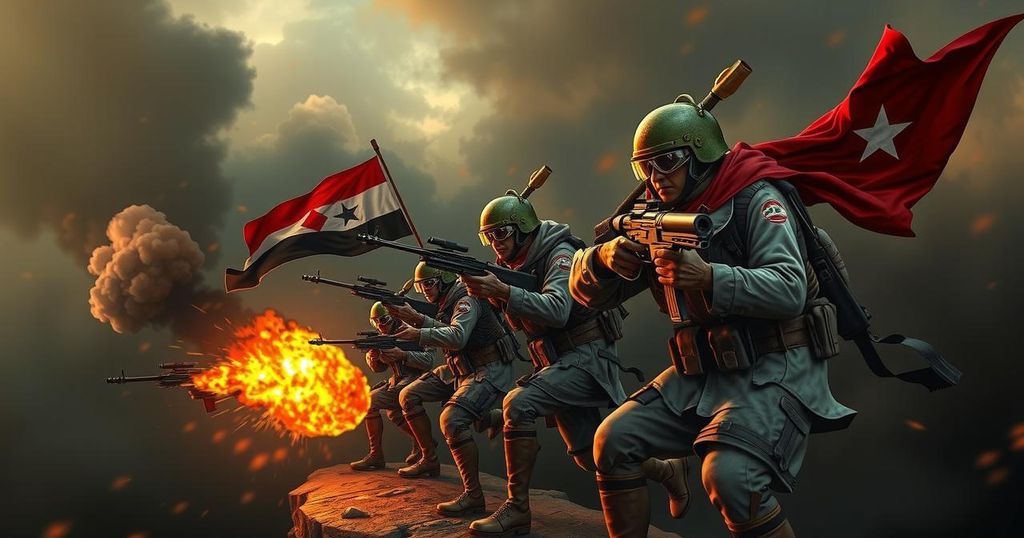Syria’s Rebels Capitalize on Weakened Assad Allies in Major Offensive
Syria’s rebels achieved significant territorial gains, including Aleppo, due to weakened support for Assad from Iran, Hezbollah, and Russia. This offensive reveals vulnerabilities in Assad’s coalition, demonstrating how shifting geopolitics can alter conflict dynamics.
In recent developments within the Syrian conflict, rebels have successfully taken advantage of the diminished support for President Bashar al-Assad from key allies, namely Iran, Hezbollah, and Russia. These allies have faced significant challenges, including military setbacks and ongoing conflicts, which provided the opposition forces with a rare opportunity to launch an offensive. The insurgents have rapidly gained ground, capturing substantial territory, including nearly all of Aleppo, a major city in Syria. This shift underscores the weakening position of Assad’s coalition, revealing vulnerabilities that had not been acknowledged prior to this momentous turn in the war.
The Syrian civil war, ongoing for over a decade, was initially sparked by anti-government protests and has evolved into a complex struggle involving multiple actors from both local and international fronts. Historically, Assad’s regime has relied heavily on military and logistical support from Iran, Hezbollah, and Russia, which collectively bolstered its combat capabilities through direct military engagement and air support. However, a series of events has led to a noticeable decline in this support.
Israeli airstrikes have significantly compromised Iranian operational capabilities and reduced Hezbollah’s effectiveness, particularly following the recent military exchanges in the region. Simultaneously, Russia’s preoccupation with its protracted conflict in Ukraine has diverted attention and resources away from Syria. Analysts assert that these external pressures have left Assad increasingly isolated, as demonstrated by his dwindling military effectiveness in the face of a strategic rebel offensive.
As the rebels prepared for a surprise attack, they capitalized on the weakened presence of their adversaries, launching their offensive at a calculated moment. This initiative was not solely based on military readiness but also appeared to be driven by a timely assessment of the regional geopolitical landscape. With Turkey’s shifting stance also influencing tactical calculations, these developments suggest a radical reconfiguration of alliances and power dynamics within the Syrian context.
Despite this recent victory for the rebels, the situation remains precarious as long-standing socioeconomic challenges persist in Syria. Assad’s regime has struggled to improve living conditions for its citizens, leading many military recruits to desert rather than engage in combat against the insurgency. The ongoing instability raises questions about the sustainability of the rebels’ advances and the potential for long-term change in Syria’s conflict-ridden landscape.
The Syrian civil war has spanned over 13 years, originating from peaceful protests that were met with violent repression by the Assad government. Over time, the conflict evolved into a multifaceted war involving multiple domestic factions and foreign powers. Major supporters of the Assad regime, including Iran, Hezbollah, and Russia, have played pivotal roles in propping up the government through military support. However, these allies have faced significant challenges and strategic setbacks, drastically altering the balance of power within the conflict. The recent offensive by rebel forces illustrates an opportunity exploited amidst Assad’s precarious alliances, indicating a potential shift in the war’s dynamics.
The recent offensive by Syria’s rebel forces signifies a critical juncture in the Syrian conflict, arising from the unexpected vulnerabilities in Assad’s military alliances. The decline of support from Iran, Hezbollah, and Russia has emboldened opposition forces to take decisive actions, resulting in significant territorial gains. Despite this development, the enduring challenges faced by both the regime and opposition may shape future engagements in a volatile geopolitical landscape. The ongoing instability and humanitarian fallout underscore the complexities intrinsic to resolving the Syrian crisis.
Original Source: www.nytimes.com




Post Comment